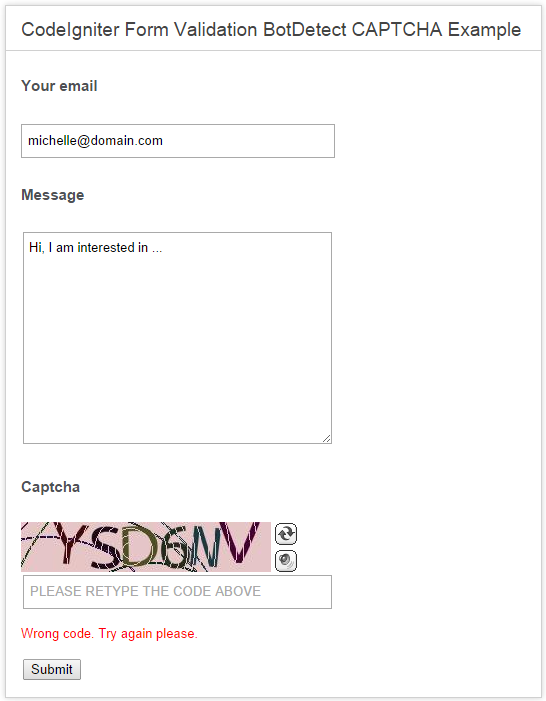CodeIgniter 2.2 Form Validation BotDetect CAPTCHA Example (BotDetect v3.0; deprecated)
First Time Here?
Check the BotDetect CodeIgniter 2.2 Captcha Quickstart for key integration steps.
This code example shows how to integrate Form Validation library.
The brief example is based around a contact form which sends email if the user input is considered valid – a likely real world scenario for Captcha protection integration.

Files for this ('codeigniter_form_validation_captcha_example') example:
/application/config/routes.php/application/views/botdetect/contact.php/application/controllers/contact.php
The files are available for download as a part of the BotDetect Captcha CodeIgniter integration package.
Routing – /application/config/routes.php
$route['botdetect/captcha_handler/index'] = 'botdetect/captcha_handler/index'; $route['botdetect/captcha_resource/get/(:any)'] = 'botdetect/captcha_resource/get/$1';
In the code above we have registered default route of the Captcha library.
View – /application/views/botdetect/contact.php
<!DOCTYPE html> <html lang="en"> <head> <meta charset="utf-8"> <title>CodeIgniter Form Validation BotDetect CAPTCHA Example</title> <link type="text/css" rel="Stylesheet" href="<?php echo CaptchaUrls:: LayoutStylesheetUrl() ?>" /> <link type="text/css" rel="Stylesheet" href="<?php echo base_url(); ?> css/style.css" /> </head> <body> <div id="container"> <h1>CodeIgniter Form Validation BotDetect CAPTCHA Example</h1> <div id="body"> <?php if ($emailSent) { ?> <h2>Thank you!</h2> <p>Your message was sent succesfully.</p> <p><?php echo anchor('contact', 'Try it again!'); ?></p> <?php } else { ?> <?php echo form_open('contact'); ?> <h5>Your email</h5> <?php echo form_input( array( 'name' => 'Email', 'id' => 'Email', 'value' => set_value('Email'), 'maxlength' => '100', 'size' => '50' ) );?> <?php echo form_error('Email'); ?> <h5>Message</h5> <div> <?php echo form_textarea( array( 'name' => 'Message', 'id' => 'Message', 'value' => set_value('Message'), 'maxlength' => '100', 'size' => '50' ) );?> </div> <?php echo form_error('Message'); ?> <?php // Captcha is only shown if not already solved if (!$captchaSolved) { ?> <h5>Captcha</h5> <div> <?php echo $captchaHtml; ?> <?php echo form_input( array( 'name' => 'CaptchaCode', 'id' => 'CaptchaCode', 'value' => '', 'maxlength' => '100', 'size' => '50' ) );?> </div> <?php echo form_error('CaptchaCode'); ?> <?php }; // end if(!$captchaSolved) ?> <div><?php echo form_submit('submit', 'Submit'); ?></div> </form> <?php }; // end if($emailSent) ?> </div> </div> </body> </html>
The View part of this example is straightforward. We add input fields of supplied type and length. Our Captcha Html is placed above the form field designated for retyping in the characters from the Captcha image, and only shown if the user hasn't already solved the Captcha challenge.
Controller – /application/controllers/contact.php
<?php if ( ! defined('BASEPATH')) exit('No direct script access allowed'); class Contact extends CI_Controller { public function index() { // Captcha parameters: $captchaConfig = array( 'CaptchaId' => 'FormCaptcha', // a unique Id for the Captcha instance 'UserInputId' => 'CaptchaCode' // Id of the Captcha code input textbox ); // load the BotDetect Captcha library $this->load->library('botdetect/BotDetectCaptcha', $captchaConfig); $this->load->helper(array('form', 'url')); $this->load->library(array('form_validation', 'email')); $this->form_validation->set_error_delimiters('<p class="validation_errors"> ', '</p>'); $validationConfig = array( array( 'field' => 'Email', 'label' => 'Email', 'rules' => 'required|valid_email' ), array( 'field' => 'Message', 'label' => 'Message', 'rules' => 'required|min_length[6]' ), array( // Captcha code user input validation rules 'field' => 'CaptchaCode', 'label' => 'Captcha code', 'rules' => 'callback_captcha_validate' ) ); $this->form_validation->set_rules($validationConfig); $data['emailSent'] = false; if ($_POST) { // run form validation when the form is submitted if ($this->form_validation->run() == true) { // the form validation (including Captcha validation) passed, send // email; we'll include some code showing how to send mail from // CodeIgniter, but please note that this code is not production // safe, and is simplified for the purposes of this example $from = $this->input->post('email'); $message = $this->input->post('message'); $this->email->from($from); $this->email->to('TODO: email address of recipient'); $this->email->subject('TODO: subject'); $this->email->message($message); // TODO: uncomment only after you have configured your email settings //$this->email->send(); // reset Captcha status after each email sent, since we don't want the // user to be able to send an unlimited number of emails after solving // the Captcha once $this->botdetectcaptcha->Reset(); $data['emailSent'] = true; } else { // the form validation failed, don't send email } } // the Captcha is not shown if the user already solved it but validation // of other form fields failed if(!$this->botdetectcaptcha->IsSolved) { $data['captchaSolved'] = false; $data['captchaHtml'] = $this->botdetectcaptcha->Html(); } else { $data['captchaSolved'] = true; $data['captchaHtml'] = ''; } $this->load->view('botdetect/contact', $data); } // Captcha validation callback used in form validation public function captcha_validate($code) { // user considered human if they previously solved the Captcha... $isHuman = $this->botdetectcaptcha->IsSolved; if (!$isHuman) { // ...or if they solved the current Captcha $isHuman = $this->botdetectcaptcha->Validate($code); } // set error if Captcha validation failed if (!$isHuman) { $this->form_validation->set_message('captcha_validate', 'Please retype the characters from the image correctly.'); } return $isHuman; } } ?>
The Controller part of the example provides the necessary helpers and data for the View to use, adding Captcha validation functionality as outlined in the BotDetect CodeIgniter 2.2 integration guide.
The Captcha library is loaded and provided with a unique ID and the name of the corresponding form field that the user enters the code into.
Form helper is loaded and provides a way to compose the form in the View. The Form validation library is configured with validation rules for each field and supplied with a custom callback for the Captcha input field. The callback captcha_validate() wraps BotDetect Captcha validation calls and provides the result to the CodeIgniter Form Validation Library.
The $_POST variable is checked to see if the form was submitted, in which case, the form validation runs. Note that the code does not display the Captcha if it was solved once and the other fields fail to validate. In case that the whole form, including the Captcha is considered valid, the code proceeds to compose and send a email using the CodeIgniter email library.
Please Note
The information on this page is out of date and applies to a deprecated version of BotDetect™ CAPTCHA (v3.0).
An up-to-date equivalent page for the latest BotDetect Captcha release (v4) is BotDetect v4 Captcha documentation index.
General information about the major improvements in the current BotDetect release can be found at the What's New in BotDetect v4.0 page.
Current BotDetect Versions
-
BotDetect ASP.NET CAPTCHA
2019-07-22v4.4.2 -
BotDetect Java CAPTCHA
2019-07-22v4.0.Beta3.7 -
BotDetect PHP CAPTCHA
2019-07-22v4.2.5












